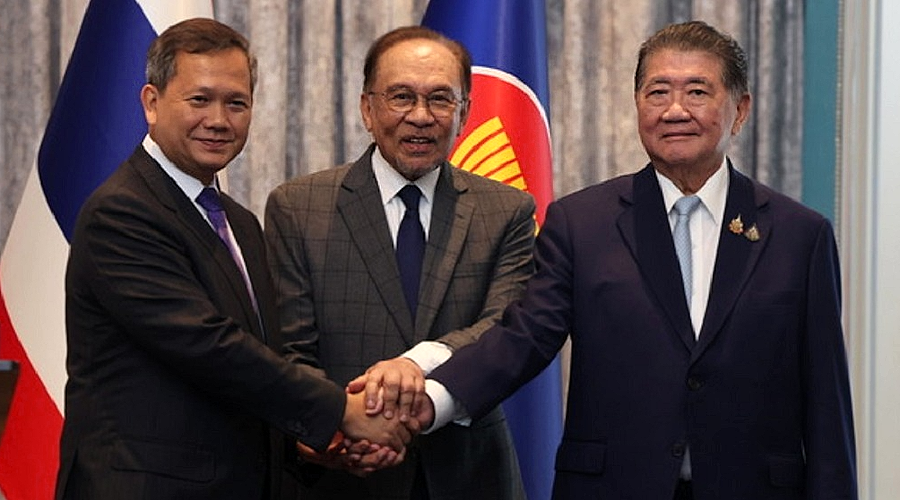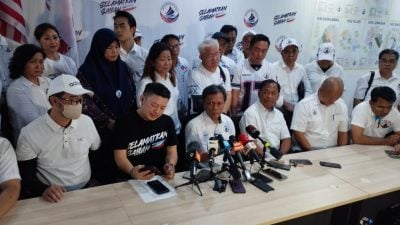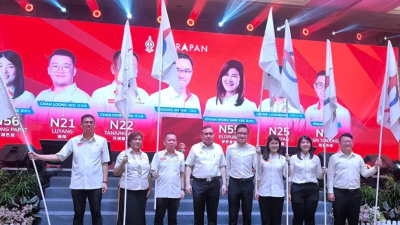
Prime Minister Datuk Seri Anwar Ibrahim’s approval ratings hit rock bottom during the judicial crisis and anti-Anwar rallies; many predicted he wouldn’t win another term.
However, as the old saying goes, a crisis is an opportunity. Opportunity always favors the prepared and the lucky.
After the crisis, an opportunity arose.
Thailand and Cambodia had a border conflict, triggered by an ancient temple.
Of course, there are more complex reasons behind it, such as the power struggle between the Thai government and military, and the Cambodian leader’s need for support based on national sentiment, which are the main causes of the conflict.
But neither country really wants a full-blown war. The cost of fighting over a rather desolate, ruined ancient temple is too high.
If a war does break out, the economic impact on both countries would be immense.
Both rely heavily on tourism, and tourists would stay away, essentially shutting down their economies.
However, it is also impossible for either side to back down voluntarily. Neither can afford to lose face, and their governments will lose public support.
Originally, Cambodia wanted to negotiate directly with Thailand, but the Thais, wary of the phone-gate incident, were highly suspicious of Hun Sen and were reluctant to open the door.
In this deadlock, a third party’s help is needed. And the most ideal candidate is none other than Anwar.
Malaysia holds the rotating chairmanship of ASEAN, and Anwar is a diplomatic leader passionate about regional and international affairs who maintains good relationships with leaders across ASEAN.
Anwar also has the endorsement of both the United States and China. Both China and the US need a stable situation in Southeast Asia but don’t want the other to dominate the ceasefire negotiations and gain geopolitical advantage.
Therefore, letting Malaysia mediate serves the interests of both powers.
Of course, it’s undeniable that Anwar possesses diplomatic wisdom and didn’t try to take all the credit.
The ceasefire agreement signed in Putrajaya was hosted by Malaysia, co-organized by the US, and involved China.
Anwar stood at the center with Thailand’s Phumtham Wechayachai and Cambodia’s Hun Manet on either side, while US Ambassador to Malaysia Edgard Kagan and Chinese Ambassador to Malaysia Ouyang Yujing stood behind, firmly securing the ceasefire agreement.
US president Donald Trump claimed he proactively called for the Thailand-Cambodia ceasefire, but he didn’t forget to praise Anwar’s mediation.
In praising Anwar, Trump also didn’t forget to take some credit for himself. The reason is simple: the ceasefire was not the work of one person but the result of efforts from all sides.
Trump also offered a special return gesture to Anwar by planning to visit Malaysia in October for the ASEAN Summit, giving Anwar a lot of face.
Trump had skipped Malaysia in his previous trips to Asia. If this visit goes ahead, it will be only the third time in history a US president has visited Malaysia.
Furthermore, the US-Malaysia tariff reduction from 25 percent to 19 percent was unexpected, reassuring the business community.
This series of diplomatic successes has completely reversed Anwar’s slump.
Suddenly, praise is pouring in from all directions, and criticism is reduced to mere ripples.
Anwar has used his victories on the diplomatic stage to turn around his domestic political losses.
This series of diplomatic successes has completely reversed Anwar’s slump. Suddenly, praise is pouring in from all directions, and criticism is reduced to mere ripples.
His success in the Thailand-Cambodia ceasefire, along with his high-profile statements on the Palestinian issue, lead to calls for Anwar to be nominated for the Nobel Peace Prize.
Although this is not a widespread movement yet, if handled skillfully, even if he doesn’t win, it can elevate Anwar’s image as a peacemaker and boost his popularity at home.
This is the same tactic used by Trump and his team, who have repeatedly emphasized his qualifications for the Nobel Peace Prize.
Trump’s focus on the peace prize is partly to create a legacy for himself, and partly not to lose to his opponent, the Democratic Party, as Obama had already won the Nobel Peace Prize in 2009.
Although it’s too early to say if Anwar makes it to the final shortlist, Malaysians would naturally be happy to see it happen.
If he wins, it would be a first for Malaysia and a source of national pride.
It’s worth noting that Anwar adopted a flexible and pragmatic stance on the Thailand-Cambodia conflict, talking less about ideology and focusing on solving the problem, earning the trust of major powers.
On the Palestinian issue, if Anwar adopts a similar approach—facing the reality of the situation, talking less about religion and ideology and focusing on resolving the conflict—he could gain the trust of the warring parties and the support of Arab, US, and European countries, which would make him a stronger candidate to be a peace envoy for the Israel-Hamas conflict.
The 1994 Nobel Peace Prize was awarded jointly to PLO leader Yasser Arafat, Israeli Prime Minister Yitzhak Rabin and Foreign Minister Shimon Peres, because they focused on reality and set aside historical hatreds, which led to a precious period of peace between Israel and Palestine.
For Anwar, or anyone else, to bring about peace, they can only follow this path, not by intensifying ethnic, religious, and ideological conflicts.
Winning the Nobel Peace Prize is not impossible, but Trump wants it too!
It’s a race, and everyone will have to work hard for it!
ADVERTISEMENT
ADVERTISEMENT








































